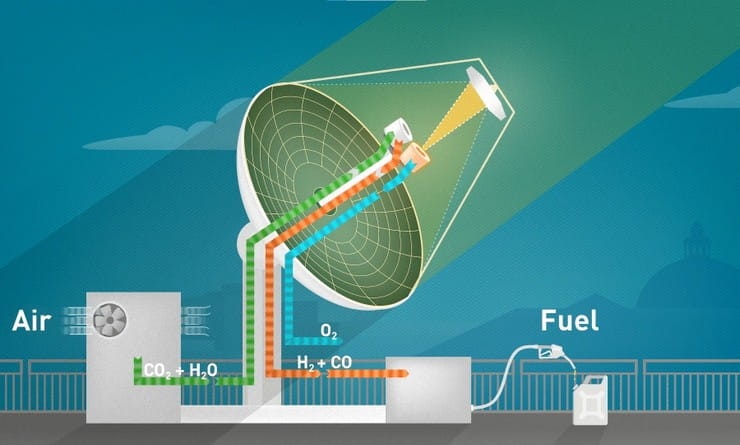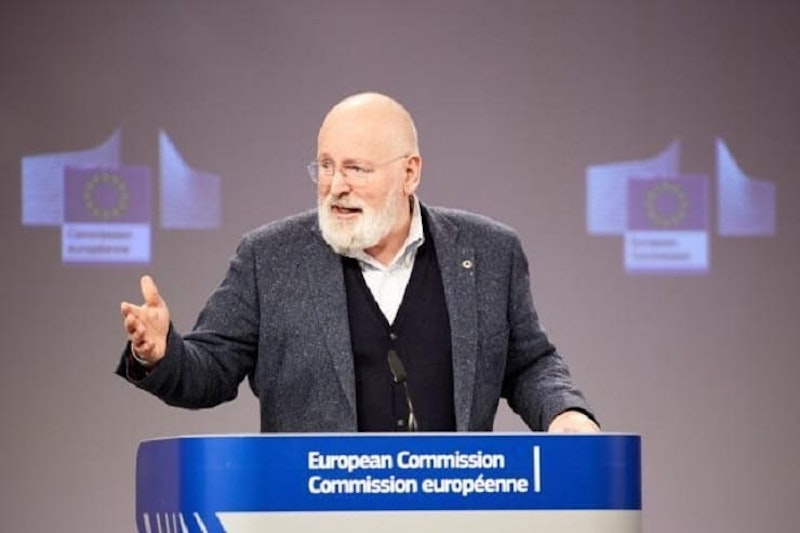Combustion engines thrown a lifeline by new EU deal
By Ben Purvis
Motorcycle Journalist
27.03.2023
ETH Zurich’s prototype air-to-fuel plant creates liquid fuel from fresh air and sunlight
We recently went into depth about how carbon-neutral e-fuel could be the environmentally-friendly way forward for motorcycles given the difficulties in creating battery-electric bikes that can match existing machines in performance, range and price. Now the EU has also seen the potential – reaching a deal with the German government to allow combustion engine vehicles to remain on the market beyond the self-imposed 2035 ‘zero emissions’ cut-off date.
There’s just one proviso: those future ICE cars must run exclusively on climate-neutral e-fuel.
The short explanation of e-fuels is that they’re synthetic ‘drop-in’ liquid hydrocarbon replacements for petrol (or diesel, or jet fuel) created from carbon that’s harvested from the air – reducing the amount of CO2 in the atmosphere – and hydrogen. To be climate neutral, the process needs to be done using renewable energy, but there are already prototype plants creating e-fuels and both MotoGP and F1 are planning to transition from fossil fuels to synthetic e-fuels in the near future.
Although the EU doesn’t currently have rules in place to enforce a ban on combustion engine motorcycles, emissions rules for bikes are rapidly aligning with those for cars so logically the same requirement to have no carbon emissions will be put in place.
The UK’s position is similar to that of the EU. For cars, the plan is to phase out new sales purely petrol and diesel cars by 2030 (hybrids will still be allowed) and to require zero tailpipe emissions from new cars by 2035. The UK Government is also looking at the same dates for motorcycles, with proposals – yet to be enshrined in law – that would see new low-performance bikes (up to 125cc-equivalent) need to be zero-emissions by 2030 and all new bikes to follow suit five years later.
EU Commission Vice President Frans Timmermans confirmed the e-fuel deal
Although battery power is proving to be a viable way forward for cars, with most major manufacturers adopting the technology, it’s much more difficult to achieve for motorcycles to achieve the same transition without sacrifices in terms of cost, range and performance.
The simple fact is that battery technology is still a long way from allowing the same energy density as hydrocarbon fuel. While cars can get away with growing in both size and weight to accommodate the big batteries needed to get the same performance and range as their petrol or diesel equivalents, the same doesn’t apply to motorcycles. What’s more, a bike’s engine, transmission and fuel tank make up a much larger proportion of its total size and mass, compounding the problem moving to electric power.
For short-range scooters and bikes, electric power does make a lot of sense, but despite some high-profile attempts at bigger electric models – like the LiveWire One (formerly the Harley-Davidson LiveWire) – there’s relatively little indication that mainstream manufacturers believe they can replace their high-performance, long-range bikes with electric equivalents. KTM is among the most vocal on this matter, despite being in the vanguard of the electric bike movement with the Freeride-E and being a founder member of the European Swappable Battery Motorcycle Consortium that’s pushing for a standardised battery for electric bikes. The company’s boss, Stefan Pierer, has repeatedly said that e-fuels are the future for motorcycles with performance above the level of a 250cc machine.
German Transport Minister Volker Wissing
The EU had previously been sceptical about e-fuels, initially saying that combustion engine cars running on climate-neutral hydrocarbon fuel would not be considered ‘zero emission’ under its 2035 ban – albeit with a proviso to reconsider the technology in 2026.
That position sparked ire, particularly from Germany’s vast car industry, which has been a strong proponent of e-fuels, and from German Transport Minister Volker Wissing who’s added his voice to the calls for climate-neutral hydrocarbon fuels to be considered.
Now EU Commission Vice President Frans Timmermans has hammered out a deal that will allow the e-fuels to be used, on the proviso that they are genuinely climate-neutral.
Over the weekend, Timmermans tweeted: “We have found an agreement with Germany on the future use of efuels in cars.
“We will work now on getting the CO2-standards for cars regulation adopted as soon as possible, and the Commission will follow-up swiftly with the necessary legal steps to implement recital 11.”
Wissing confirmed the deal, tweeting: “The way is clear: Europe remains technology-neutral. Vehicles with combustion engines can also be newly registered after 2035 if they only use CO2-neutral fuels.
“We secure opportunities for Europe by retaining important options for climate-neutral and affordable mobility.”
The deal means that investment in carbon-neutral e-fuels is likely to increase, pushing them towards mass production faster. E-fuels were always going to be required – they’re an essential step towards making aircraft, which (like motorcycles) can’t easily accommodate the mass and size of batteries needed to shift to electric power. By allowing the same technology to be more widely adopted, the door should be opened to the faster development of ‘drop-in’ petrol replacements, which not only allow future combustion engines to be carbon-neutral but could also allow existing cars and bikes to reduce or eliminate their carbon footprint.
Share on social media:

